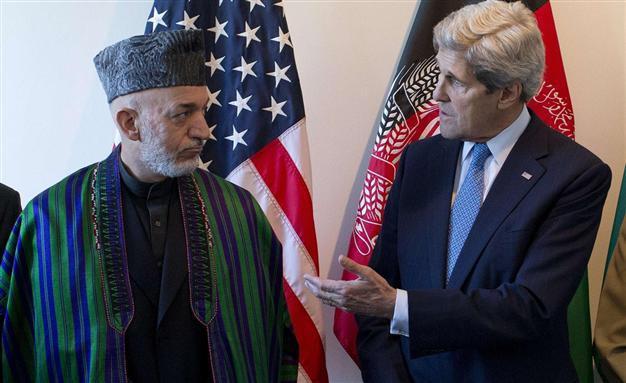Afghan President Karzai confirms received CIA cash
KABUL

US Secretary of State John Kerry, centre, meets with Afghan President Hamid Karzai (left) on April 24, 2013, in Brussels. AFP Photo/Evan Vucci, Pool
Afghan President Hamid Karzai on Monday confirmed that his government received money from the US Central Intelligence Agency, following reports of cash being handed over in suitcases and backpacks, Agence France-Presse has reported.
"Yes, the NSC of Afghanistan has received money from CIA in the past 10 years. The amount was not big, rather it was small," Karzai said in a statement, referring to the National Security Council which is part of the president's office.
The New York Times reported on Monday that Karzai's office had received tens of millions of dollars in cash over more than a decade in a CIA effort to win influence.
Karzai said the money had been used for good causes in Afghanistan, where endemic corruption is one of the main problems undermining efforts to establish a stable state.
"The money was spent for different reasons: operation objectives, helping wounded and sick (people) and for house rents and others objectives," the president said.
"These assistances were very productive and we thank them."
CIA ‘delivers’ cash to Afghanistan's Karzai to buy influence, report claimsTens of millions of U.S. dollars in cash were delivered by the CIA in suitcases, backpacks and plastic shopping bags to the office of Hamid Karzai for more than a decade to buy influence for the spy agency, the New York Times has claimed, citing current and former advisers to the Afghan leader.
“We called it ‘ghost money,’” said Khalil Roman, who served as the Afghan leader’s deputy chief of staff from 2002 until 2005. “It came in secret, and it left in secret.”
The so-called “ghost money” was meant to buy influence for the CIA but instead fuelled corruption and empowered warlords, undermining Washington’s exit strategy from Afghanistan, the newspaper quoted U.S. officials as saying.
“The biggest source of corruption in Afghanistan,” one American official said, “was the United States.” The CIA declined to comment on the report and the U.S. State Department did not immediately comment. For more than a decade the cash was dropped off every month or so at the Afghan president’s office, the report said.
Handing out cash has been standard procedure for the CIA in Afghanistan since the start of the war. The cash payments to the president’s office do not appear to be subject to oversight and restrictions placed on official American aid to the country or the CIA’s formal assistance programs, like financing Afghan intelligence agencies, and do not appear to violate U.S. laws, said the daily.
There was no evidence that Karzai personally received any of the money, Afghan officials told the newspaper. The cash was handled by his National Security Council, it added. U.S. and Afghan officials familiar with the payments were quoted as saying that the main goal in providing the cash was to maintain access to Karzai and his inner circle and to guarantee the CIA’s influence at the presidential palace, which wields tremendous power in Afghanistan’s highly centralized government.
Much went to warlords, politiciansMuch of the money went to warlords and politicians, many with ties to the drug trade and in some cases the Taliban, the New York Times said. U.S. and Afghan officials were quoted as saying the CIA supported the same patronage networks that U.S. diplomats and law enforcement agents struggled to dismantle, leaving the government in the grip of organized crime. In 2010, Karzai said his office received cash in bags from Iran, but that it was a transparent form of aid that helped cover expenses at the presidential palace. He said at the time that the United States made similar payments.
The latest report said much of the Iranian cash, like the CIA money, went to pay warlords and politicians. For most of Karzai’s 11-year reign, there has been little interest in anti-corruption in the army or police. The country’s two most powerful institutions receive billions of dollars from donors annually but struggle just to recruit and maintain a force bled by high rates of desertion.
